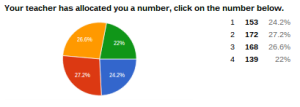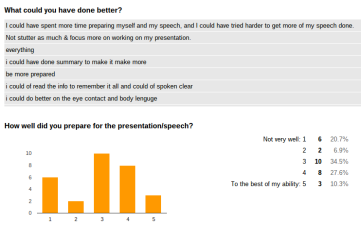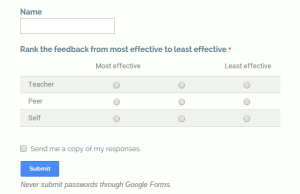This is not innovative, it isn’t new but I thought I would share how we used Google forms as peer assessment during presentations.
I hate presentations. I know, I shouldn’t and if I do, then why am I doing them? And if they are so b ad, what am I doing to change that?
ad, what am I doing to change that?
What I hate is the time, time to login, time to get students PowerPoint or multimodal feature up. Time when it doesn’t work. Time that is wasted.
This time, I didn’t hate it as much. Using Google Classroom, students completed their presentations and they were automatically shared with in one spot. All of a sudden, I had time, less ‘I don’t want to do it’ and more focus on everyone doing it.
Another thing I hate about wasting time is when the students aren’t learning from each other. In the past we have used rubrics/feedback sheets for students to give peer feedback. This has generally led me with the biggest pile of paper and not much else. Realistically my students didn’t care as much and it was just haphazard. I have had huge success with peer feedback through Scholar, so I know my students are capable of giving good feedback and applying this feedback, so I knew that technology was key.
We decided to experiment with Google forms. When we were looking at how to do this, we decided that we’d have each student focus on a different aspect as opposed to all 4 areas. We also decided that students would give feedback to all students.

In year 7 students were given a number and a few presentations they would change number. Each student completed all 4 areas. I thought this was important as it gave me more feedback about their understanding of ‘good eye contact’, as well as ‘effective use of visuals’.
me more feedback about their understanding of ‘good eye contact’, as well as ‘effective use of visuals’.
We have trolley of iPads, so we used these for students to complete the form on. Some used their own device (iPad, tablet, mobile phone etc).
What I found impressive was the summary of responses, this data has helped inform my practice. I am able to look at the data and see where the strengths and weaknesses apply for year 7, as well as breaking this down by class. As well as getting data that looks nice in graph, we asked student to comment on an area of strength and an area of improvement. Not only did they really need to think through their ideas, there was a level of accountability, they had all put their names to this and they knew it was going to the presenting student.
As well as getting data that looks nice in graph, we asked student to comment on an area of strength and an area of improvement. Not only did they really need to think through their ideas, there was a level of accountability, they had all put their names to this and they knew it was going to the presenting student.

Another teacher who teachers year 10 has tweaked this for her class, she had 1 iPad at each table group (4 students) and they had to discuss, justify their answers and give feedback on at least 2 of the elements (their choice).
Here is an example of the survey – feel free to click through, this will not affect our results. Feel free to email me if you would like me to share the editable form.
While the students were completing the peer feedback form, the presenting student was completing a self-reflection form. This added another layer of accountability and information to help support our teaching.

There is one more form that the students will do early next week after they receive my feedback. And this one will be really important for me.

Credit also goes to Jennifer Nott, Laura Hicks, Hayley Borg and Rachael Radvanyi.
 t was written by Rachael Radvanyi and Jennifer Nott as few years ago, since then Rachael has taught it a few times and worked to develop, edit and refine the unit. Over the holidays we typed it up in Scholar and adapted it to work for our current year 7 students. I’ve had negative feedback about the move from CGLearner to CGScholar but some staff, change is hard for some, but the change is for the better.
t was written by Rachael Radvanyi and Jennifer Nott as few years ago, since then Rachael has taught it a few times and worked to develop, edit and refine the unit. Over the holidays we typed it up in Scholar and adapted it to work for our current year 7 students. I’ve had negative feedback about the move from CGLearner to CGScholar but some staff, change is hard for some, but the change is for the better. ad, what am I doing to change that?
ad, what am I doing to change that?
 me more feedback about their understanding of ‘good eye contact’, as well as ‘effective use of visuals’.
me more feedback about their understanding of ‘good eye contact’, as well as ‘effective use of visuals’. As well as getting data that looks nice in graph, we asked student to comment on an area of strength and an area of improvement. Not only did they really need to think through their ideas, there was a level of accountability, they had all put their names to this and they knew it was going to the presenting student.
As well as getting data that looks nice in graph, we asked student to comment on an area of strength and an area of improvement. Not only did they really need to think through their ideas, there was a level of accountability, they had all put their names to this and they knew it was going to the presenting student.


